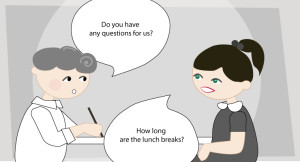I have delivered a few interview skills talks and workshops recently and one part of the interview students almost always fear is at the end when the recruiter asks you: "Do you have any questions for us?" This blog post written by our Careers Adviser Saiyada Fazal gives you important advice and information about exactly how to tackle this dreaded part of the interview.
It can be all too easy to get towards the end of a job interview and not ask any questions. Because, let's face it, all you probably want to know is 'have I got the job?' and 'how much will it pay?' But the questions you ask your prospective employer are just as important as the answers you give during an interview.
Although job interviews often feel like an interrogation, they're meant to be a conversation between you and a potential employer. Asking the right questions during a job interview can not only help you build a dialogue, but it can also help you evaluate if the job is right for you.
So, lets start with questions you shouldn't ask during an interview:
- How much will you pay / what is the benefits package / how much holiday will I get / what are my work hours?*
- What happened to the last person who did this job?
- Can you explain what your business does?
- When can I start using the company discount?
The reason for avoiding these questions during an interview is that you want to use the opportunity, to demonstrate your drive to excel in the role and the fact that you've done some homework (researched the company, industry and department). You want to leave the employer with a positive and memorable impression of you as a potential candidate.
A general rule is that you should ask no more than two questions (the employer may have other candidates they are interviewing and you don't want to hijack their time). The best questions are open ended and don't ask for information that can easily be found on the organisations website. Avoid negative or aggressive questions, you want to focus on building a rapport with the interviewer.
Examples of good questions to ask during an interview:
Can you tell me how the role relates to the overall structure of the organisation? with this question you're drawing attention to a preference for teamwork. It looks as though you want to know where you would fit in and how your contribution would affect the rest of the company.
How would you describe the work culture here? this signals that you want to operate at your optimum and understand that for this you require a positive environment. This indicates you're a good self-manager who is aware of how to get the best out of yourself.
What do you think are the most important qualities for someone to excel in this role? this question can often lead to valuable information that’s not in the job description. It can help you learn about the company culture and expectations so you can show that you are a good fit.
In what way is performance measured and reviewed? this question flags up that you appreciate the importance of delivering real results. You will be seen as someone who understands the value of commitment, reliability and returns.
What are the most important issues that you think your business is currently facing? or I have noticed, you recently introduced a new product/service/division/project; how will this benefit the business? these variations both show that you are interested in the job and employer behind it too. It also shows you have researched the organisation which demonstrates motivation.
If you decide you genuinely have no questions to ask, then turn this into an opportunity by saying, "at this stage I haven't got any questions. This is because I spent time looking through your website and read up on current projects. I also spoke to Mr. Smith at the Bath careers fair, who talked to me about the organisation culture and business priorities such as x. Therefore, at this stage I don't have any questions".
* Remember you can still clarify hours of work, salary and holidays by having a separate conversation with representatives from the organisations HR department after your interview.
If you need further interview resources, please have a look at our Succeed in the Selection Process on our website and read through our excellent Interview Guide.
Good luck in your interviews!
Respond

